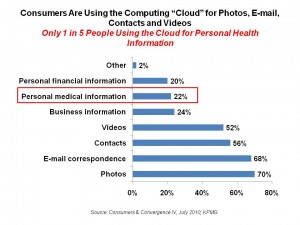People trust the Internet “cloud” to manage many parts of their personal information, especially photos, e-mail correspondence, contacts, and videos.
But personal health and financial information? Not so much. The chart illustrates that only 1 in 5 global citizens use the cloud to manage personal health information.
KPMG‘s report, Consumers & Convergence IV, highlights peoples’ feelings about privacy and security of their personal information, from vacation pictures to 401(k) statements. The verdict: most people trust of the cloud to store and share most kinds of their information except for their medical and financial information.
Two-thirds of people globally use cloud computing applications, KPMG found. Use of the cloud for financial transaction via mobile phones increased by 29% in the past year.
No surprise, then, that privacy is a big issue. While peoples’ willingness to opt-in to targeted advertising (especially for free services or lower costs), KPMG found a higher level of privacy-anxiety.
KPMG segmented out of its survey sample a group called “Information Sharers,” most of whom live in emerging markets. While they are 10% of the global sample, only 4% of Information Sharers live in the U.S. These are people who:
- Are willing to exchange personal information for cheaper or free content
- Are comfortable today doing banking via a mobile device
- Will be comfortable accessing personal health information on their mobile device in the next 3-5 years.
As KPMG observes, the only constant is change: the key sentence here is that, “consumers [will] redefine — on their own terms — market drivers such as trust, value, privacy and security.”
Health Populi’s Hot Points: Personal health information is very personal indeed, as KPMG’s survey of global citizens finds. Looking forward, a question is how health providers, payers, and policymakers can nudge health citizens to engage with health data in the cloud in safe, engaging ways. The four ‘market drivers’ KPMG identifies are trust, value, privacy and security. In health, trust is an enabler of engagement. Privacy and security are trust-builders. “Value” is a much-loaded concept in health care: it has to do with the consumer’s and payer’s views of health care quality and outcomes vis-à-vis what they pay for their care. Without data liquidity and transparency of that data, there is no value. And without securing that data so that consumers trust it floating in the cloud, there’s no engagement.
So convergence in health care can’t happen for the consumer until those 4, mutually-reinforcing market drivers, converge themselves for health data.





 I am so grateful to Tom Lawry for asking me to pen the foreword for his book, Health Care Nation,
I am so grateful to Tom Lawry for asking me to pen the foreword for his book, Health Care Nation,  Thanks to Feedspot for naming this blog, Health Populi, as a
Thanks to Feedspot for naming this blog, Health Populi, as a